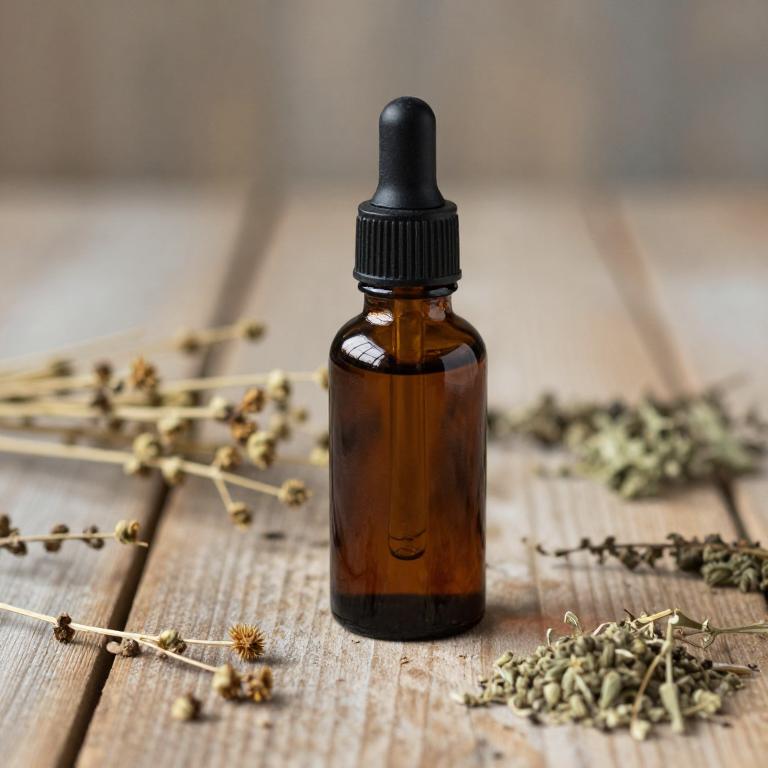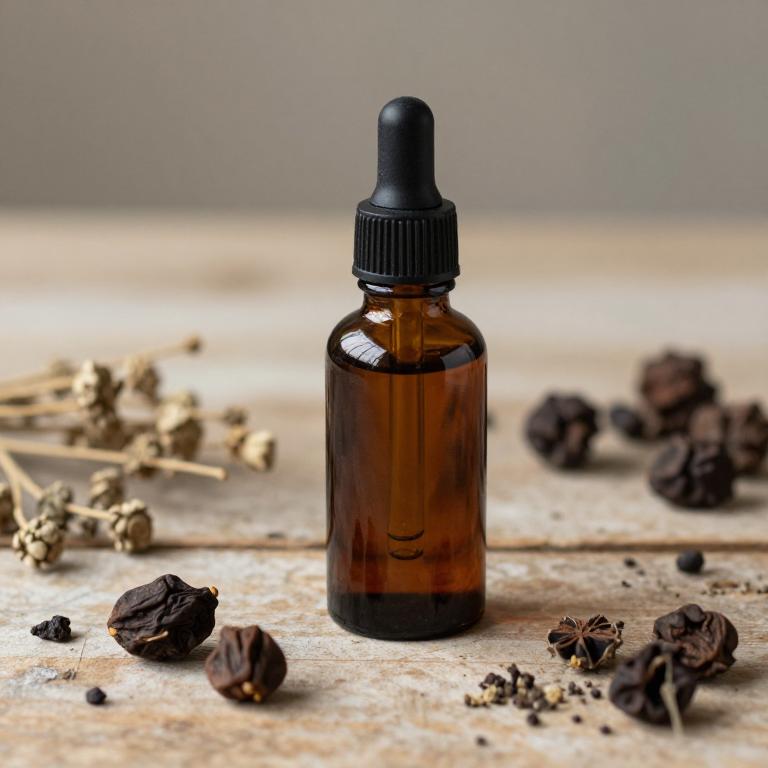10 Best Herbal Tinctures For Queasy Stomach

Herbal tinctures are concentrated liquid extracts made from medicinal plants, often used to soothe a queasy stomach by addressing underlying causes such as indigestion, nausea, or digestive discomfort.
Common herbs used in these tinctures include ginger, peppermint, licorice root, and chamomile, each known for its calming and digestive properties. These tinctures are typically taken in small doses, either directly under the tongue or diluted in water, to maximize absorption and minimize potential side effects. They offer a natural alternative to over-the-counter medications, appealing to those seeking holistic remedies for stomach issues.
However, it's important to consult with a healthcare provider before using herbal tinctures, especially if you have existing health conditions or are taking other medications.
Table of Contents
- 1. Fennel (Foeniculum vulgare)
- 2. Cumin (Cuminum cyminum)
- 3. Licorice (Glycyrrhiza glabra)
- 4. Blessed thistle (Cnicus benedictus)
- 5. Ginger (Zingiber officinale)
- 6. Thistle (Silybum marianum)
- 7. Chamomile (Matricaria chamomilla)
- 8. Peppermint (Mentha piperita)
- 9. Black pepper (Piper nigrum)
- 10. Turmeric (Curcuma longa)
1. Fennel (Foeniculum vulgare)

Foeniculum vulgare, commonly known as fennel, has been traditionally used in herbal medicine to address digestive issues, including a queasy stomach.
Fennel tinctures are prepared by soaking the dried seeds in alcohol, allowing the active compounds such as anethol and fenchone to be extracted. These compounds are known for their carminative and antispasmodic properties, which can help alleviate bloating, gas, and nausea. When taken in small doses, fennel tinctures may soothe the gastrointestinal tract and ease discomfort associated with indigestion.
However, it is important to consult a healthcare professional before using fennel tinctures, especially for individuals with existing health conditions or those taking other medications.
2. Cumin (Cuminum cyminum)

Cuminum cyminum, commonly known as cumin, is a traditional herb often used in herbal tinctures to address digestive discomfort, including a queasy stomach.
The tincture is prepared by extracting the essential oils from cumin seeds using alcohol, which helps preserve its active compounds. Cumin has been valued for its carminative properties, which can help reduce gas, bloating, and nausea. Its warming effect on the digestive system may stimulate appetite and ease stomach discomfort.
When used as a tincture, cumin can be a natural and effective remedy for mild digestive upset, though it should be used under the guidance of a qualified herbalist or healthcare provider.
3. Licorice (Glycyrrhiza glabra)

Glycyrrhiza glabra, commonly known as licorice root, has been traditionally used for its soothing effects on the gastrointestinal system.
Herbal tinctures made from licorice root are often used to alleviate symptoms of a queasy stomach due to their anti-inflammatory and demulcent properties. These tinctures can help reduce irritation in the stomach lining and ease nausea by promoting a protective mucous barrier. However, long-term use of licorice root tinctures may lead to side effects such as hypertension due to its effect on aldosterone levels.
As with any herbal remedy, it is advisable to consult a healthcare provider before use, especially for individuals with pre-existing medical conditions.
4. Blessed thistle (Cnicus benedictus)

Cnicus benedictus, also known as blessed thistle, is a traditional herbal remedy commonly used in tincture form to address digestive issues, including a queasy stomach.
This herb is believed to support digestion by stimulating the production of bile and promoting the elimination of toxins from the body. When prepared as a tincture, Cnicus benedictus is often taken in small doses to help alleviate symptoms such as nausea, bloating, and indigestion. It is particularly favored in herbal medicine for its gentle yet effective action on the gastrointestinal system.
However, it is important to consult with a healthcare professional before using this tincture, especially for individuals with pre-existing health conditions or those taking other medications.
5. Ginger (Zingiber officinale)

Zingiber officinale, commonly known as ginger, has been widely used for centuries to alleviate digestive discomfort, including queasy stomachs.
Ginger tinctures are concentrated liquid extracts made by soaking fresh or dried ginger root in alcohol, allowing the active compounds like gingerol and shogaol to be extracted. These compounds are known for their anti-inflammatory and antiemetic properties, which can help reduce nausea and settle the stomach. When taken in small doses, ginger tinctures can provide a natural and effective remedy for motion sickness, morning sickness, and general digestive upset.
However, it is important to consult with a healthcare professional before use, especially for individuals with existing health conditions or those taking medications.
6. Thistle (Silybum marianum)

Silybum marianum, also known as milk thistle, is a herbal remedy commonly used in the form of tinctures to support digestive health.
These tinctures are often recommended for individuals experiencing a queasy stomach due to their potential to soothe the gastrointestinal tract and reduce inflammation. The active compound, silymarin, is believed to have antioxidant and anti-inflammatory properties that may aid in protecting the liver and improving digestion. When taken as a tincture, silybum marianum is typically diluted in water or another liquid to make it more palatable and effective.
However, it is important to consult with a healthcare provider before use, especially if you have existing medical conditions or are taking other medications.
7. Chamomile (Matricaria chamomilla)

Matricaria chamomilla, commonly known as German chamomile, is widely used in herbal tinctures to soothe a queasy stomach due to its calming and anti-inflammatory properties.
The tincture is typically made by extracting the essential oils from the dried flowers of the plant using alcohol, which preserves its active compounds. Chamomile tinctures are often recommended for digestive discomfort, including nausea, indigestion, and upset stomach, as they help reduce gastrointestinal spasms and promote relaxation of the digestive tract. The mild, pleasant scent of chamomile also has a calming effect on the nervous system, which can further aid in relieving stress-related digestive issues.
When used as directed, chamomile tinctures can be a safe and effective natural remedy for those seeking relief from a queasy stomach without the use of pharmaceuticals.
8. Peppermint (Mentha piperita)

Mentha piperita, commonly known as peppermint, is a popular herb used in tinctures to alleviate symptoms of a queasy stomach.
These tinctures are typically made by soaking fresh or dried peppermint leaves in alcohol, allowing the active compounds to infuse into the liquid. Peppermint contains menthol and other volatile oils that help relax the muscles of the digestive tract, reducing spasms and soothing nausea. The cooling effect of peppermint can also help ease an upset stomach and promote a sense of calm.
When taken in appropriate doses, peppermint tinctures are often considered a natural and effective remedy for digestive discomfort.
9. Black pepper (Piper nigrum)

Piper nigrum, commonly known as black pepper, has been traditionally used in herbal medicine for its digestive benefits.
Black pepper tinctures are often prepared using alcohol to extract the essential compounds, including piperine, which is believed to enhance digestion and alleviate gastrointestinal discomfort. These tinctures may help soothe a queasy stomach by stimulating the production of digestive enzymes and improving gut motility. While some studies suggest that piperine can enhance the absorption of certain nutrients, more research is needed to confirm its efficacy for nausea.
As with any herbal remedy, it is advisable to consult a healthcare professional before use, especially for individuals with existing medical conditions or those taking other medications.
10. Turmeric (Curcuma longa)

Curcuma longa, commonly known as turmeric, is a widely used herbal remedy known for its anti-inflammatory and antioxidant properties.
Curcuma longa herbal tinctures are often prepared by extracting the active compounds from the rhizome using alcohol, making them easier to absorb into the bloodstream. These tinctures are traditionally used to alleviate symptoms of a queasy stomach, such as nausea and indigestion, due to their soothing and carminative effects. The primary active compound, curcumin, is believed to help reduce stomach inflammation and improve digestion.
However, it is important to consult with a healthcare professional before using curcuma longa tinctures, especially for individuals with existing health conditions or those taking other medications.